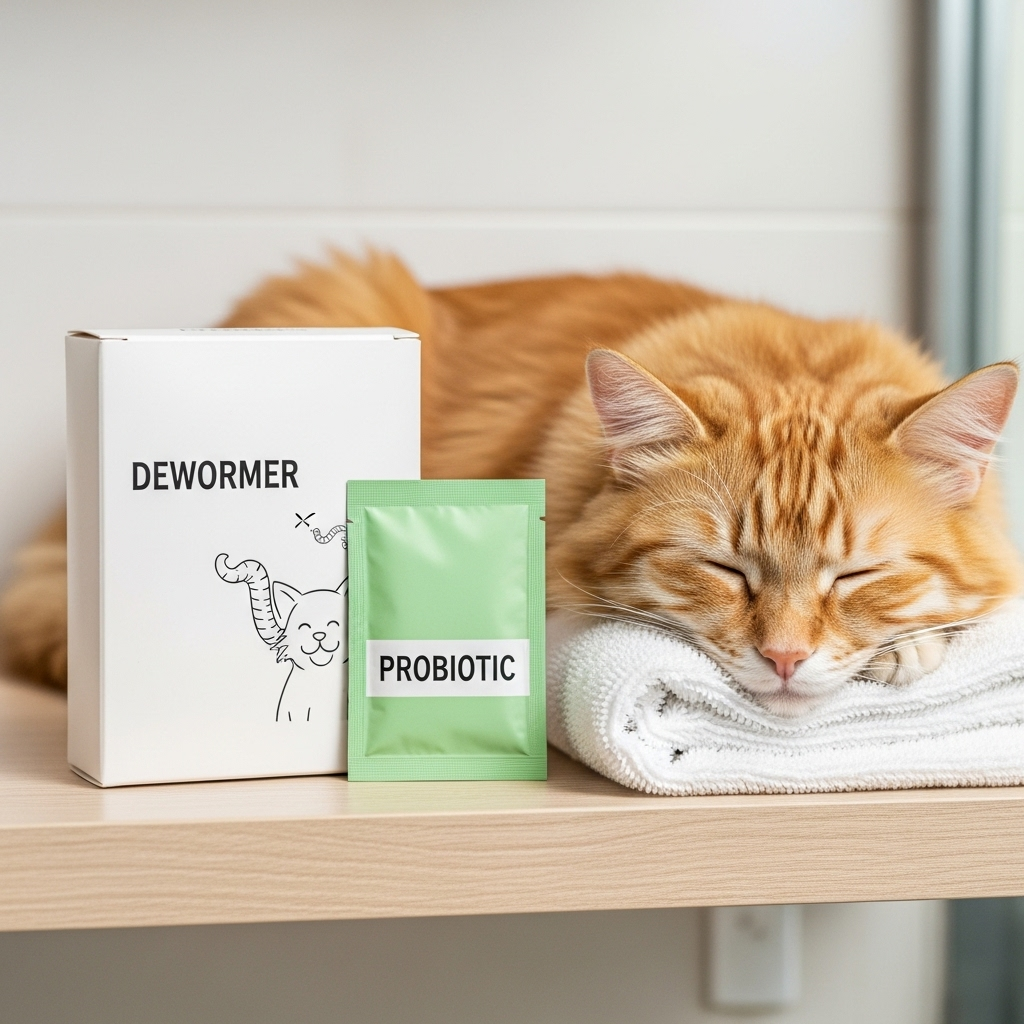Probiotics for Cats After Deworming: Recovery Basics

After a round of deworming, many cat owners notice changes in appetite, stool consistency, or energy. This is often temporary, but supporting the gut microbiome with appropriate probiotics can help some cats recover more comfortably. Below is a clear, practical guide for pet owners about when and how to use probiotics after deworming, what to expect, and important safety notes.
Why consider probiotics after deworming?
Deworming medications (anthelmintics) target intestinal parasites but can also disturb the balance of bacteria and yeasts that normally live in a cat’s gut. A disrupted microbiome can contribute to transient diarrhea, soft stools, reduced appetite, or mild stomach upset. Probiotics — live microbes or beneficial yeasts taken as a supplement — aim to help restore a healthy microbial balance and support digestion and immune function during recovery.
What evidence supports their use?
Clinical studies in companion animals show probiotics can reduce the duration or severity of diarrhea in some cases and support intestinal health. Evidence varies by strain, product quality, and the cause of gastrointestinal upset. For post-deworming recovery specifically, the data are limited but suggest potential benefit for reducing mild, transient gut symptoms when used appropriately and under veterinary guidance.
Which probiotic types are commonly used in cats?
Common organisms found in feline probiotic products include:
- Lactobacillus species (e.g., L. acidophilus, L. rhamnosus)
- Bifidobacterium species (e.g., B. animalis)
- Enterococcus faecium (pet-specific strains)
- Saccharomyces boulardii (a beneficial yeast often used for diarrhea)
Look for products formulated for cats or labeled for companion animals. Human probiotics sometimes contain ingredients that aren’t ideal for pets (flavorings, xylitol, excessive fillers).
When to start probiotic support
Timing depends on your cat’s condition and the dewormer used. General guidance:
- If your cat has mild, short-lived soft stools after deworming, probiotics can often be started the same day or within 24–48 hours.
- If your cat has severe vomiting, bloody stools, fever, lethargy, or signs of systemic illness, contact your veterinarian before giving probiotics.
- For very young kittens, pregnant or immunocompromised cats, consult your vet before starting any supplement.
How to choose a product and dose
Key selection and dosing points:
- Choose a product labeled for cats or all pets with clear strain identification and CFU (colony-forming units) at the time of manufacture.
- Follow the manufacturer’s dosing instructions or your veterinarian’s advice. Typical over-the-counter doses vary widely; many cat products provide a daily dose appropriate for weight and age.
- Probiotic therapy often lasts 7–28 days for short-term recovery, but your vet may recommend a different duration.
- Consider formulations that are easy to give: powders to mix into wet food, pastes, or single-dose sachets.
Administration tips
- If using a powder or capsule, mix into a small amount of highly palatable wet food to ensure full consumption.
- Give probiotics at a consistent time each day; some vets suggest with a meal to improve survival of organisms through the stomach.
- Store according to label instructions. Some strains require refrigeration to maintain potency.
Possible side effects and warnings
Most cats tolerate probiotics well. Mild side effects can include temporary gas, bloating, or slightly looser stools during the first few days as the microbiome adjusts. Stop use and contact your veterinarian if you notice:
- Worsening diarrhea or vomiting
- Blood in the stool
- Signs of severe illness (high fever, collapse, extreme lethargy)
Do not give live probiotics to animals with serious immunodeficiency or those on potent immunosuppressive therapy without veterinary oversight—rare infections related to probiotic organisms have been reported in immunocompromised patients.
Practical scenarios
Healthy adult cat with mild diarrhea after deworming
Start a vet-recommended cat probiotic the same day or within 48 hours, follow the product dose for 7–14 days, monitor stool and appetite, and contact your vet if no improvement within 48–72 hours.
Kitten or immunocompromised cat
Always check with your veterinarian before giving probiotics. Your vet may recommend specific strains, lower doses, or alternative supportive care such as fluids and diet changes.
Pros and Cons
| Pros | Cons |
|---|---|
| May shorten duration of mild post-deworming diarrhea and support appetite | Evidence varies by strain; benefits not guaranteed for every cat |
| Generally safe and easy to administer when vet-approved | Possible mild side effects (gas, transient loose stool) and rare risks in immunocompromised animals |
| Many pet-specific products available in palatable forms | Product quality varies—some lack clear strain or potency information |
FAQ
Q: How long should I give probiotics after deworming?
A: A typical course is 7–28 days depending on symptoms and product instructions. Follow your veterinarian’s recommendation for duration based on your cat’s response.
Q: Can probiotics interact with deworming medications?
A: Probiotics do not generally interfere with common anthelmintics. Starting a probiotic shortly after deworming is usually safe, but discuss timing with your vet if you have concerns about specific medications.
Q: Are human probiotics OK for cats?
A: Some human probiotics may be safe, but many contain unnecessary additives or inappropriate dosing. Choose a product labeled for cats or consult your veterinarian before using human formulations.
Q: When should I call the vet instead of treating at home?
A: Contact your vet if your cat has severe or persistent vomiting, bloody stools, fever, weakness, signs of dehydration, or if mild symptoms don’t improve in 48–72 hours with supportive care.
Key Takeaways
- Deworming can temporarily disrupt gut microbes; probiotics may help some cats recover more comfortably.
- Choose pet-specific products with identified strains and clear dosing; follow label or veterinary guidance.
- Start probiotics for mild post-deworming gut upset, but consult your vet for kittens, immunocompromised, or severely ill cats.
- Most cats tolerate probiotics well; watch for mild, transient side effects and stop if symptoms worsen.
- If in doubt, contact your veterinarian to tailor probiotic selection and duration to your cat’s needs.
Disclaimer: This information is educational and not a substitute for veterinary care. Always consult your veterinarian before starting supplements, especially for young kittens, pregnant cats, or animals with chronic illness or compromised immunity.

Leave a Reply